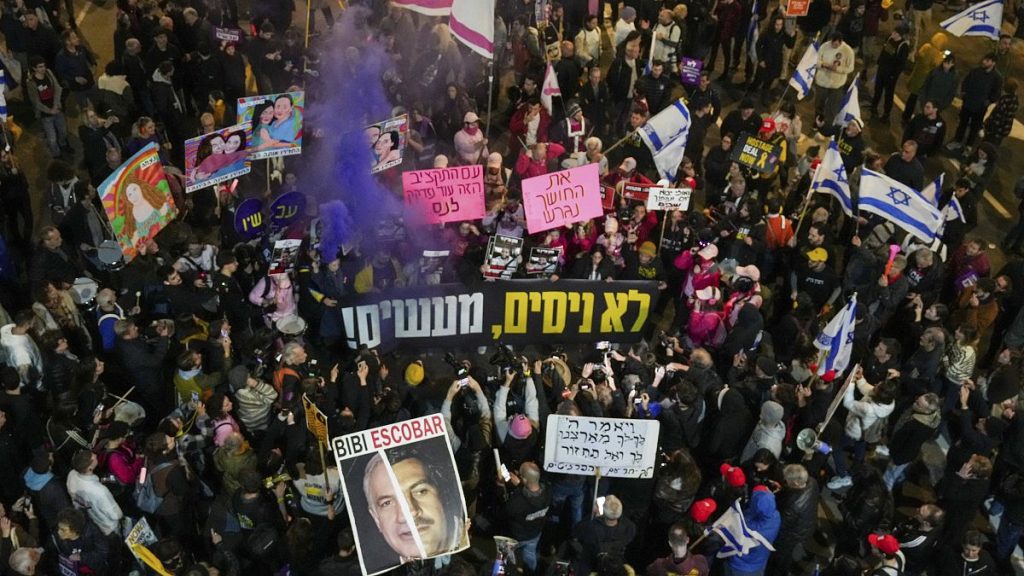The devastating Hamas incursion into southern Israel in October 2023 etched a deep wound in the nation’s psyche, leaving a trail of grief and uncertainty. The militants’ brutal attack claimed the lives of at least 1,200 people, shattering families and communities. Adding to the tragedy, approximately 250 individuals were abducted and taken hostage to Gaza, plunging their loved ones into an agonizing wait. This act of aggression ignited a renewed conflict between Israel and Hamas, further complicating the already volatile situation in the region. The capture of both living hostages and the remains of fallen soldiers has become a focal point of national concern, driving weekly protests and demanding government action.
In the aftermath of the incursion, the issue of the hostages has become a central focus for Israelis. Weekly rallies have taken root in Tel Aviv, drawing crowds demanding the government prioritize their return. These gatherings serve as a poignant reminder of the human cost of the conflict, with families of the captured pleading for their loved ones’ release. The calls for action resonate with a sense of urgency, emphasizing the moral and ethical imperative to bring the hostages home. The rallies have also become a platform for broader political discourse, with some participants expressing dissatisfaction with the government’s handling of the crisis and demanding Prime Minister Benjamin Netanyahu’s resignation.
Amidst the ongoing conflict, glimmers of hope have emerged for a potential resolution. Mediation efforts, spearheaded by the United States, Qatar, and Egypt, have intensified, with reports indicating a growing willingness from both Israel and Hamas to reach a ceasefire agreement. These negotiations carry the weight of immense expectation, as they hold the key to ending the 14-month war and, crucially, securing the release of the remaining hostages. The path to a lasting peace remains fraught with challenges, but the renewed diplomatic engagement offers a glimmer of hope for a brighter future.
A previous truce, brokered in November 2023, resulted in the release of over 100 hostages in exchange for Palestinian prisoners held in Israeli prisons. While this exchange provided a measure of solace, the fate of the remaining captives continues to weigh heavily on the nation. Estimates suggest that around 100 hostages remain in Gaza, with the grim reality that at least a third are believed to have perished. This heartbreaking statistic underscores the urgency of the ongoing negotiations and the importance of securing the return of those still alive, as well as the remains of the deceased.
The human cost of this protracted conflict extends far beyond the immediate casualties of the October incursion. Israel’s subsequent bombardment and ground invasion of Gaza have resulted in a staggering loss of life, with estimates from Gaza’s Health Ministry indicating over 45,000 Palestinian fatalities, more than half of whom were women and children. The ministry’s figures do not distinguish between combatants and civilians, further highlighting the indiscriminate nature of the violence. The offensive has left a trail of destruction, displacing a vast majority of Gaza’s 2.3 million residents, many of whom have experienced multiple displacements.
The ongoing conflict between Israel and Hamas continues to cast a long shadow over the region. The capture of Israeli hostages during the October incursion has galvanized public opinion and placed immense pressure on the government to secure their release. While diplomatic efforts offer a glimmer of hope, the road to a lasting peace is fraught with challenges. The immense human cost of the conflict, measured in lives lost, families shattered, and communities displaced, underscores the urgent need for a resolution. The weekly rallies in Tel Aviv serve as a powerful reminder of the human dimension of this tragedy and the unwavering hope for the return of the hostages. As negotiations continue, the world watches with bated breath, hoping for a breakthrough that will bring an end to the violence and allow for the healing process to begin.














